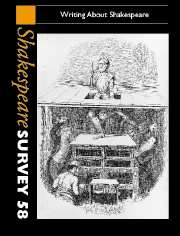Book contents
- Frontmatter
- Having Our Will: Imagination in Recent Shakespeare Biographies
- Toward a New Biography of Shakespeare
- Jonson, Shakespeare and the Exorcists
- ‘Lending soft audience to my sweet design’: Shifting Roles and Shifting Readings of Shakespeare’s ‘A Lover’s Complaint’
- ‘Armed at point exactly’: The Ghost in Hamlet
- Writing About Motive: Isabella, the Duke and Moral Authority
- Writing Performance: How to Elegize Elizabethan Actors
- Elizabeth Montagu: ‘Shakespear’s poor little Critick’?
- Rewriting Lear’s Untender Daughter: Fanny Price as a Regency Cordelia in Jane Austen’s Mansfield Park
- The Prequel as Palinode: Mary Cowden Clarke’s Girlhood of Shakespeare’s Heroines
- Shakespeare Among the Workers
- Virginia Woolf Reads Shakespeare: Or, her Silence on Master William
- Shakespeare and the Invention of the Epic Theatre: Working with Brecht
- Dramatizing the Dramatist
- Shakespeare in Drama Since 1990: Vanishing Act
- Writing about [Shakespearian] performance
- Shakespeare and the Prospect of Presentism
- Writing Shakespeare in the Global Economy
- The ‘Complexion’ of Twelfth Night
- Translation as Appropriation: Vassilis Rotas, Shakespeare and Modern Greek
- How Old Were Shakespeare’s Boy Actors?
- Mistress Tale Porter and the Triumph of Time: Slander and Old Wives’ Tales in The Winter’s Tale
- Shakespeare Performances in Ireland, 2002–2004
- Shakespeare Performances in England, 2004
- Professional Shakespeare Productions in the British Isles January–December 2003
- The Year's Contributions to Shakespearian Study 1 Critical Studies
- 2 Shakespeare in Performance
- 3 Editions and Textual Studies
- Books Received
- Index
Having Our Will: Imagination in Recent Shakespeare Biographies
Published online by Cambridge University Press: 28 March 2007
- Frontmatter
- Having Our Will: Imagination in Recent Shakespeare Biographies
- Toward a New Biography of Shakespeare
- Jonson, Shakespeare and the Exorcists
- ‘Lending soft audience to my sweet design’: Shifting Roles and Shifting Readings of Shakespeare’s ‘A Lover’s Complaint’
- ‘Armed at point exactly’: The Ghost in Hamlet
- Writing About Motive: Isabella, the Duke and Moral Authority
- Writing Performance: How to Elegize Elizabethan Actors
- Elizabeth Montagu: ‘Shakespear’s poor little Critick’?
- Rewriting Lear’s Untender Daughter: Fanny Price as a Regency Cordelia in Jane Austen’s Mansfield Park
- The Prequel as Palinode: Mary Cowden Clarke’s Girlhood of Shakespeare’s Heroines
- Shakespeare Among the Workers
- Virginia Woolf Reads Shakespeare: Or, her Silence on Master William
- Shakespeare and the Invention of the Epic Theatre: Working with Brecht
- Dramatizing the Dramatist
- Shakespeare in Drama Since 1990: Vanishing Act
- Writing about [Shakespearian] performance
- Shakespeare and the Prospect of Presentism
- Writing Shakespeare in the Global Economy
- The ‘Complexion’ of Twelfth Night
- Translation as Appropriation: Vassilis Rotas, Shakespeare and Modern Greek
- How Old Were Shakespeare’s Boy Actors?
- Mistress Tale Porter and the Triumph of Time: Slander and Old Wives’ Tales in The Winter’s Tale
- Shakespeare Performances in Ireland, 2002–2004
- Shakespeare Performances in England, 2004
- Professional Shakespeare Productions in the British Isles January–December 2003
- The Year's Contributions to Shakespearian Study 1 Critical Studies
- 2 Shakespeare in Performance
- 3 Editions and Textual Studies
- Books Received
- Index
Summary
‘The biographer begins, of course, with the town of Stratford-upon-Avon, where Mr. Shakspere was born and died, giving a lengthy, nostalgic description of Stratford in Shakespeare’s time, refulgent with the glow of small-town boyhood.’ As Joseph Sobran sarcastically indicates, there is indeed something ‘almost comically formulaic’ about Shakespeare biographies. Of course, this is equally true of other biographies; what the Renaissance would call copia is perhaps inevitable in Shakespeare’s case, when there are so many books and so few facts. Since Sobran is an Oxfordian, he naturally makes a distinction between the ‘Shakspere’ of Stratford and the ‘Shakespeare’ who wrote the plays. He is right about this too: there is a gap between the biographical and the literary figure, though not, I think, because they were two different people. After two decades of writing about Shakespeare’s life, Sir Sidney Lee concluded that ‘The literary history of the world proves the hopelessness of seeking in biographical data, or in the fields of everyday business, the secret springs of poetic inspiration.’ This view, famously insisted on by T. S. Eliot, was once taken for granted in literary criticism. It is now largely superseded, on the one hand, by cultural materialism, which wants to know all it can about those ‘fields of everyday business’, and, on the other, by the postmodern taste for indeterminacy, which has readmitted legendary and anecdotal evidence in order to play with alternative life stories. And so Stephen Greenblatt argues, in his recent contribution to the biographical tradition, ‘to understand how Shakespeare used his imagination to transform his life into art, it is important to use our own imagination’.
- Type
- Chapter
- Information
- Shakespeare Survey , pp. 1 - 8Publisher: Cambridge University PressPrint publication year: 2005

